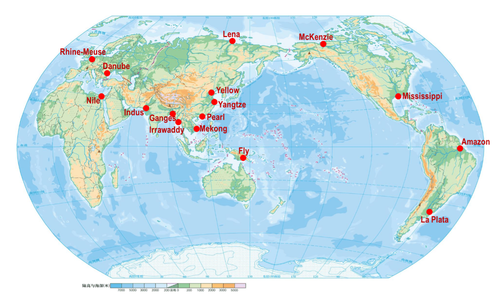About the MegaDelta Programme
An international endeavour to study the status and threats facing 25 deltas worldwide
Published on 26 September 2023 | articles
Deltas, located at the interface of land and sea, are dynamic regions heavily influenced by terrestrial and marine factors. However, these areas are facing increasing environmental pressures due to factors such as population growth, urbanization, and climate change. These pressures cause coastal erosion and subsidence, flooding, freshwater supply, energy provision, pollution, and loss of biodiversity. These issues hinder the achievement of the United Nations' sustainable development goals (SDGs) in deltaic regions, such as eradicating poverty (SDG 1), ensuring clean water and sanitation (SDG 6), and promoting sustainable cities and communities (SDG 11).
The Mega-Delta Programme, also known as "Mega-Deltas: Seeking Solutions for Sustainable Issues", is a comprehensive initiative aimed at improving the preservation of human habitation in mega-delta regions. The main goal of the program is to develop a revised development strategy that considers the unique challenges and varying levels of socio-economic development present in different types of deltas within the context of global change. This will be achieved through collaborative efforts across multiple disciplines and sectors. Ultimately, the program seeks to protect the well-being and long-term stability of these critical deltaic environments.
Themes
The Mega-Delta Programme is organized around three primary themes, aligning with those of Future Earth Coasts (formerly IGBP/IHDP LOICZ, Land–Ocean Interactions in the Coastal Zone):
- Dynamics of coupled human-nature systems, which aims to understand the evolution of deltaic systems across multiple timescales.
- Forecasting the evolution of deltaic systems, which focuses on predicting how these systems will respond to global climate change and social development.
- Solutions for sustainable development, which aims to provide pathways towards sustainability by addressing both global and local challenges.

© MegaDelta Programme
Current activities
- Development of collaboration networks: In the initial phase (2021-2023), our focus is on establishing collaboration networks in 16 selected deltas worldwide (Fig. 1). We have successfully formed a network of scholars, managers, and organizations from 17 countries. We continue to accept sub-projects, some of which include have been endorsed by UN Ocean decade as well. (https://delta.ecnu.edu.cn/Projects/list.htm).
- Co-production: We have currently compiled a preliminary database for sharing information (www.deltadatabase.tech ). An assessment report on deltaic issues and management challenges is expected to be completed by the end of 2023. We are also actively working on designing standards and methods for collecting comprehensive physical and socio-economic information necessary for assessment and prediction. Additionally, we are collaborating on the development of coupled human-nature models, which will enable us to better understand the mechanisms of deltaic evolution and inform decision-making processes.
- Mobilizing funds: We have reached out to relevant international, national, and local funding agencies to seek support for the project. At present, the funding obtained from China primarily aims at establishing specific task groups to address sustainability issues in developing countries in Asia and Africa, as well as the development of research tools for the whole programme.
- Capacity-building: In collaboration with Future Earth Coasts (FEC: https://www.futureearthcoasts.org/ ) and Integrated Marine Biosphere Research (IMBeR: https://imber.info/ ), which have International Project Offices (IPOs) based at SKLEC, ECNU, we are providing training programs to support young scientists.